|
|
|
Sort Order |
|
|
|
Items / Page
|
|
|
|
|
|
|
| Srl | Item |
| 1 |
ID:
133614
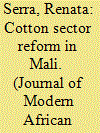

|
|
|
|
|
| Publication |
2014.
|
| Summary/Abstract |
This paper provides a detailed analysis of the cotton sector reform process in Mali from 2000 to 2011, explaining reform delays and ambiguities in terms of the wider political and socio-economic context and aid relationships. Contrary to arguments pointing to lack of state commitment and ownership, domestic stakeholders increasingly worked towards finding an acceptable and consensual reform package. The process encountered quite serious obstacles, however, due to divergent actors' incentives, and the existence of opposing philosophies about what a restructured cotton sector should look like. As a consequence of donors' misjudgement of the political and social realities underlying the Malian cotton sector, dialogue among stakeholders was difficult and polarised, forcing the government to spend considerable time and resources to find a suitable compromise. This paper contributes to a better understanding of the merits and limits of pursuing consensual policy processes against the constraints posed by divergent donors' policy paradigms.
|
|
|
|
|
|
|
|
|
|
|
|
|
|
|
|
| 2 |
ID:
132968
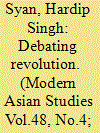

|
|
|
|
|
| Publication |
2014.
|
| Summary/Abstract |
This paper examines the public debate that happened among Delhi's Sikh community following the formation of the Khalsa by Guru Gobind Singh. The detail of this debate was expressed in the early eighteenth century Sikh text, Sri Gur Sobha. The Sri Gur Sobha explains how Delhi's Sikhs became divided into pro-Khalsa and anti-Khalsa factions, and how this conflict resulted in a campaign of persecution against Delhi's Khalsa Sikhs. In this paper I endeavour to analyse exactly why this dispute occurred and how it reflects wider political and socio-economic processes in early modern India and Sikh society. In addition, the paper will explore how the elite Khatri community consequently became an object of hatred in eighteenth century Khalsa Sikh literature.
|
|
|
|
|
|
|
|
|
|
|
|
|
|
|
|
| 3 |
ID:
126660
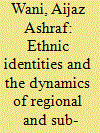

|
|
|
|
|
| Publication |
2013.
|
| Summary/Abstract |
The concept of regional and sub-regional identity as well as regional autonomy has captured the stage of Social Science. The regional autonomy aspirations and the sense of regional and sub-regional identity have offered a new dimension to the assertiveness of ethnic group. Regional identity demands in South and Southeast Asian societies have followed a uniform pattern. These regional autonomy demands evolved over a large span of time may be located in specific geographical and environmental spaces. At one level, these demands remained humane and inclusive, incorporating and reflecting broader human and universal values. At the other level, they acquired the traits of particularism which in the later stages of building multi-cultural and multi-ethnic nation states posed many problems. The plurality of politics is the hallmark of Jammu and Kashmir (J&K) State, and this polarity is essentially the result of cultural diversities that criss-cross the geographical and cultural landscape of Kashmir. The J&K State is not only a conglomerate of three distinct regions - Jammu, Kashmir, and Ladakh - but there are also regions within regions marked off from one another by geography, culture, and history. The politics of regional and sub-regionalism based on region, religion, caste, ethnicity, and so on continues to be stubbornly informed by their respective histories and cultures - thus the resistance against hegemony and the demand for sub-regional autonomies and Hill Development Councils. This article attempts at, looking into the dynamics of these assertions, its impact on the politics of the state, and to delineate the role of different socio-political and historical forces in shaping regional and sub-regional assertions in J&K without, however, suppressing the relative significance of different identity markers.
|
|
|
|
|
|
|
|
|
|
|
|
|
|
|
|
| 4 |
ID:
126661
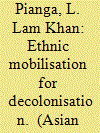

|
|
|
|
|
| Publication |
2013.
|
| Summary/Abstract |
This article attempts to communicate the methodological tension between subjectivity and objectivity by recording the aspiration of communities who are problematised both by colonialism and the modern nation-state. It highlights how colonial policy and practice contribute to the postcolonial imbroglio in Northeast India. It delineates how British colonial cartography always gave priority to 'administrative convenience' in the demarcation of boundaries, resulting in the division of ethnic community. It argues that Northeast India and the Indo-Burma borderland are not yet decolonised, as the government of India, without any rearrangement or alteration, adopts the colonial administrative boundaries, which divided ethnic communities. Neither the State Reorganisation Act (1956) nor the North-Eastern Areas (Reorganisation) Act (1971) fulfilled the aspiration of the segmented communities in the northeast, as they did in the mainland. The article also argues that the responses of the government of India towards the problems in Northeast India react to the manifested symptoms of the deep-rooted political problem rather than getting to the crux of the problem to find a solution.
|
|
|
|
|
|
|
|
|
|
|
|
|
|
|
|
| 5 |
ID:
189874
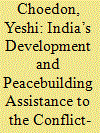

|
|
|
|
|
| Summary/Abstract |
The rationale for India’s development and peacebuilding assistance and the mechanisms employed have changed over the period. India’s assistance is starkly different from the way the developed countries do peacebuilding. This difference is due to India’s different historical experiences, socio-economic conditions and lived experience. The conflict-affected states have appreciated India’s assistance due to the suitability and appropriateness of technical assistance, training and educational programs to their socio-economic context. India’s ways of development and peacebuilding assistance have similarities with the 2016 UN concept of ‘sustaining peace’, which has been formulated to liberate peacebuilding from the strict limitation to post-conflict contexts. However, both the western and non-western donors have a certain reservation about ‘sustaining peace’ concept, for different reasons. The way forward to implement the UN ‘sustaining peace’ is to facilitate both the western and non-western donors to learn lessons from each other’s experiences and view their varied approaches as complementary rather than contradictory.
|
|
|
|
|
|
|
|
|
|
|
|
|
|
|
|
| 6 |
ID:
128126
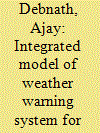

|
|
|
|
|
| Publication |
2013.
|
| Summary/Abstract |
the estuarine system of the Ganga-Brahmaputra deltaic region form the largest mangrove eco-system in the world shared between India and Bangladesh approximately in the proportion on 60:40, Sir William Wilson Hunter in his 'A Statistical Account' of Bengal (1875) writes, " The Sundarvan may described as a tangle region of estuaries, rivers and water courses, enclosing a vast number of island of various shapes and size, it has been declared as a world heritage site by UNESCO
|
|
|
|
|
|
|
|
|
|
|
|
|
|
|
|
| 7 |
ID:
128311
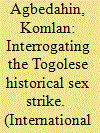

|
|
|
|
|
| Publication |
2014.
|
| Summary/Abstract |
This article, is about an attempt by women in Togo to use a sex strike to end the country's political impasse. The concept dates back to the ancient Greek comedy Lysistrata by Aristophanes, first presented publicly in 411 b.c. More recently, a sex strike had been used with some success in Liberia that inspired Togolese women to attempt this method of non-violent action. The Togolese experiment, however, ended in failure. This article discusses reasons for the failure, including inadequate preparation and miscommunication and the neglect of the political, economic, and social context of Togo.
|
|
|
|
|
|
|
|
|
|
|
|
|
|
|
|
| 8 |
ID:
128487
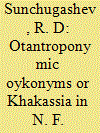

|
|
|
|
|
| Publication |
2013.
|
| Summary/Abstract |
In recent years in linguistics, investigation of proper names including anthroponymics and oykonymics has been developing extensively. Anthroponymics is a branch of onomastics, which studies anthroponyms
-personal names of people: proper names, patronymics (father's names or other names after father), surnames, tribal names, nicknames and pseudonyms (individual or group), cryptonyms (concealing names)';
oykonymics is a branch of toponymy, which studies oykonymsz, i.e. names of any settlements. These branches are still one of the poorly studied ?eld of Turkic onomastics. In Khakass toponymy considerable part of settlements' names belong to anthroponyms, i.e. proper names and surnames. Formed from anthroponyms, oykonyms give important information of linguistic, historical, ethnographical and ethnocultural nature. They point at the bygone settlement of peoples and tribes, reflect traditional folk culture
and change processes in the socio-political and economic life of people.
|
|
|
|
|
|
|
|
|
|
|
|
|
|
|
|
| 9 |
ID:
128113
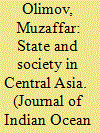

|
|
|
|
|
| Publication |
2013.
|
| Summary/Abstract |
Along with path breaking developments in Eurasia in recent decades, central Asian countries have seen changes in position, identity and orientation of previously isolated countries lying in the heart of Eurasia. Although central Asian countries were previously oriented towards North, now they have turned their attention to the South and East. integration into the international transportation network, construction of new roads, bridges and tunnels, growth of international trade, transport and migration have sharply increased their levels of interaction with the world and especially with neighbors in Eurasia and South Asia, including India.
|
|
|
|
|
|
|
|
|
|
|
|
|
|
|
|
| 10 |
ID:
130392
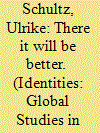

|
|
|
|
|
| Publication |
2014.
|
| Summary/Abstract |
At the time of the research, Khartoum was a multi-ethnic and multinational metropolis of 8 million people. A considerable part of the population consists of Southern Sudanese migrants and displaced persons that came during the 20 years plus of civil war in South Sudan to the capital. These people were categorised after the Comprehensive Peace Agreement (CPA), as displaced people regardless as to whether they come to the capital as labour migrants, students or because of the war to the capital. The notion of displacement assumes that they are people who are 'out of place': thereby assuming a former situation of being in place, a place that can be called 'home'. After the CPA from 2005, this frequently only imagined home became a real place for the IDP's to which they are supposed to go back. Yet, many migrants and displaced people are reluctant to move to Southern Sudan. Their decision about going to the South or staying in Khartoum depends not only on the opportunities and perspectives in their respective 'home' areas but also on the perceptions of belonging and identity. The imaginations and aspirations about the future life in South Sudan, which I analyse in this article, reflect this ambivalent positioning.
|
|
|
|
|
|
|
|
|
|
|
|
|
|
|
|
| 11 |
ID:
133529
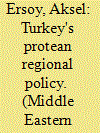

|
|
|
|
|
| Publication |
2014.
|
| Summary/Abstract |
How has regional planning been transformed in increasingly changing socio-economic and political contexts in transition economies? Why do regional planning policies and practices change? This paper explains how the policy ideas of regional development have been formulated and incorporated into the Turkish context since the establishment of modern-day Turkey in 1923. The transformation process shows how, in one way or another, policy ideas have been brought into or appeared in Turkey to shape regional policy. It emphasizes that this sort of acquisition of thinking has been translated into policy frameworks. In other words, Turkey has been taking on policies that have been devised using ideas from outside Turkey which are being dominated by growth-oriented strategies that represent a neoliberal political agenda.
|
|
|
|
|
|
|
|
|
|
|
|
|
|
|
|
|
|
|
|
|